2022年中考英语语法专题复习课件-形容词副词(46张PPT)
文档属性
| 名称 | 2022年中考英语语法专题复习课件-形容词副词(46张PPT) |  | |
| 格式 | pptx | ||
| 文件大小 | 2.8MB | ||
| 资源类型 | 教案 | ||
| 版本资源 | 通用版 | ||
| 科目 | 英语 | ||
| 更新时间 | 2022-04-12 21:29:51 | ||
图片预览

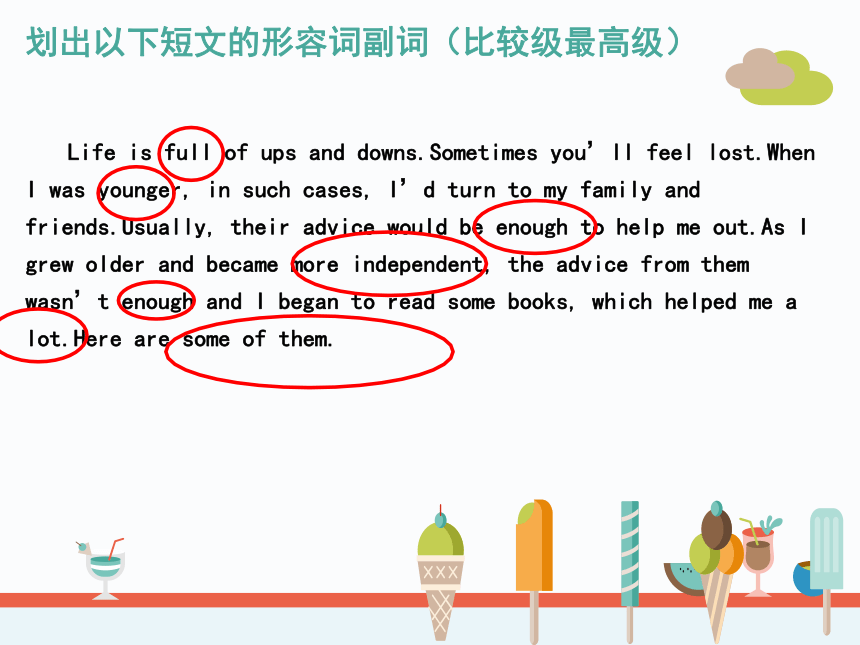
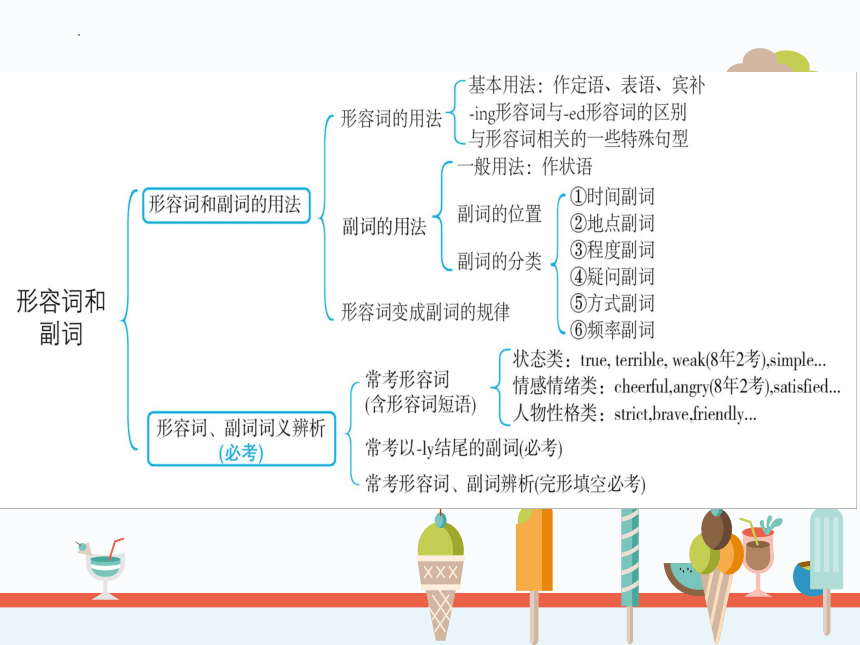
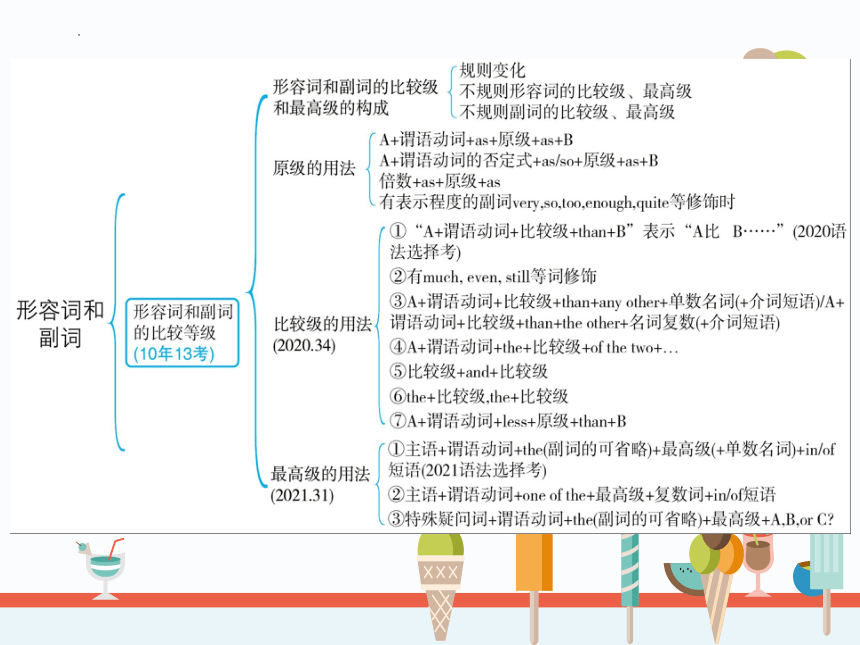

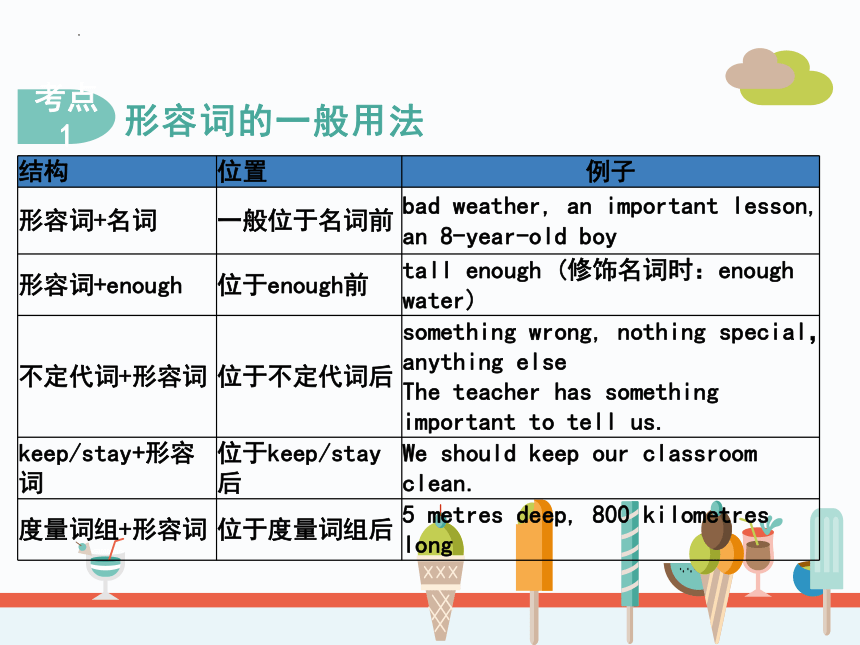
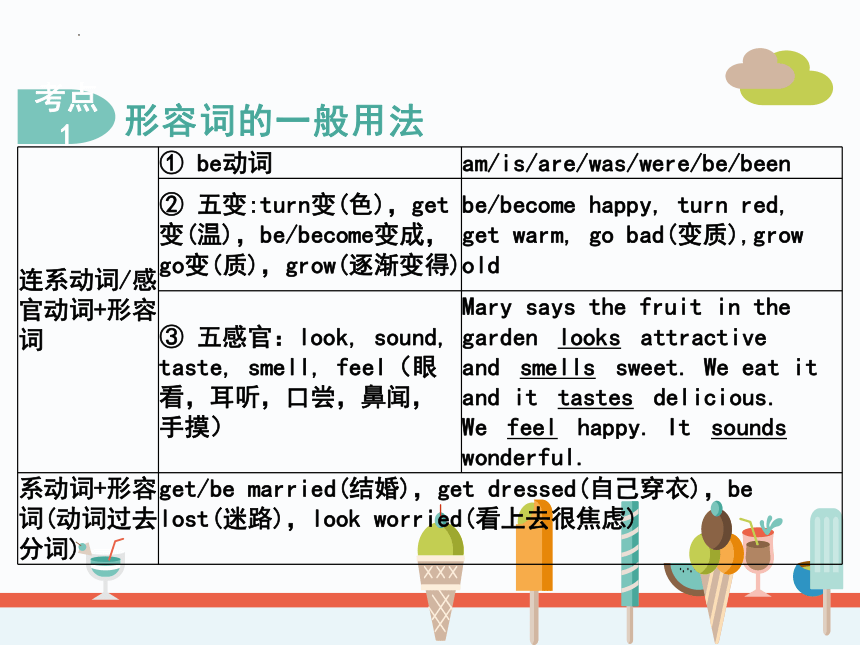
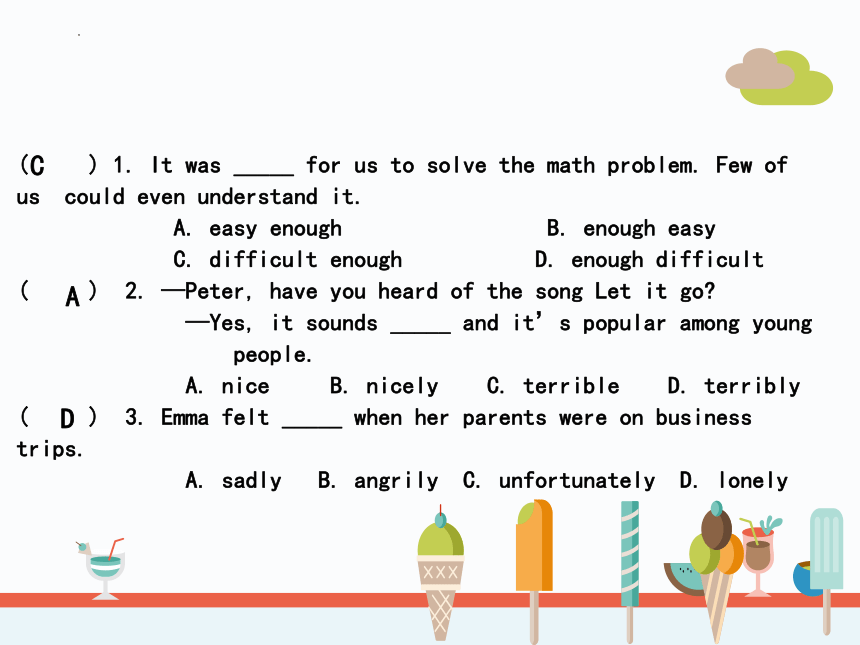
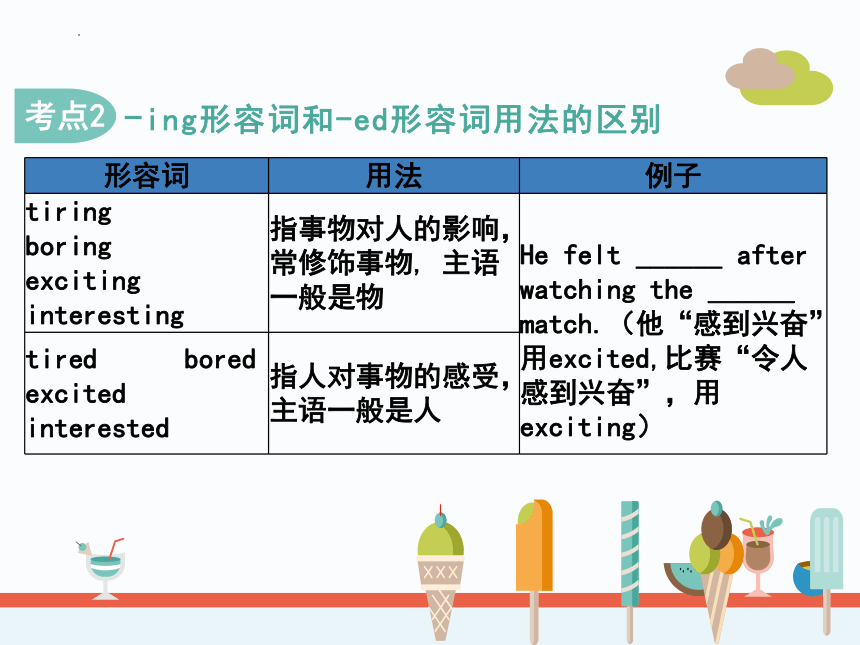
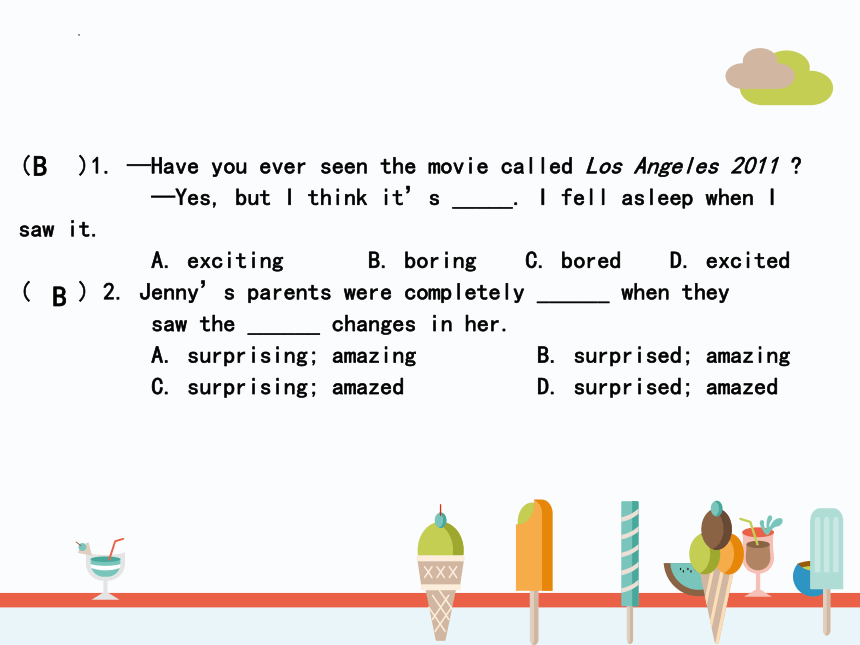
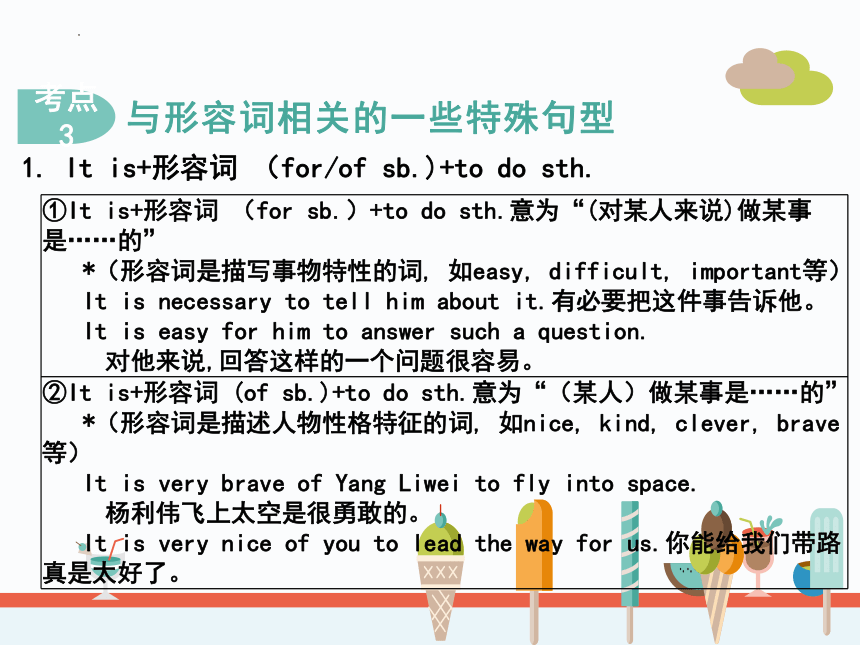
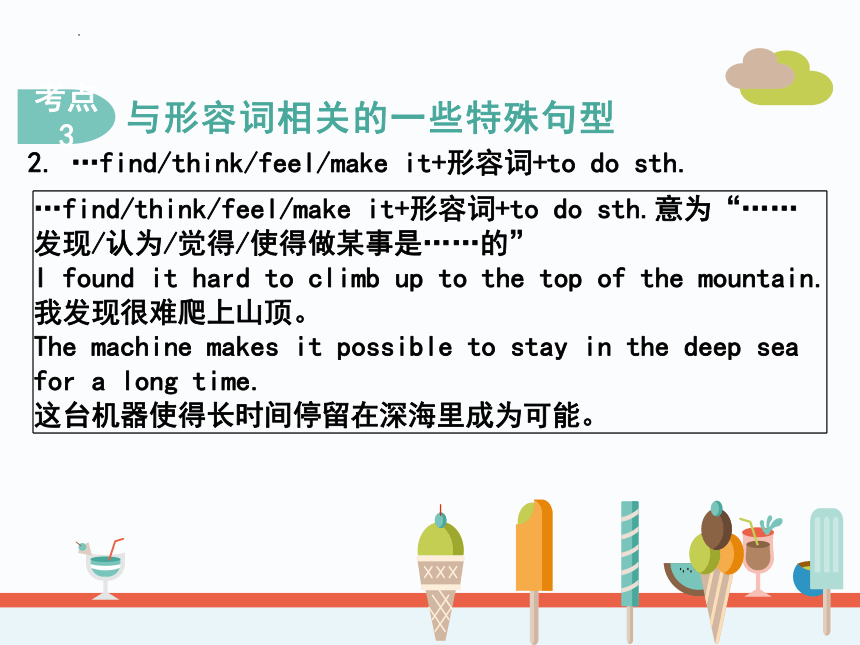
文档简介
(共46张PPT)
初三英语语法专题复习---
形容词副词
Life is full of ups and downs.Sometimes you’ll feel lost.When I was younger, in such cases, I’d turn to my family and friends.Usually, their advice would be enough to help me out.As I grew older and became more independent, the advice from them wasn’t enough and I began to read some books, which helped me a lot.Here are some of them.
划出以下短文的形容词副词(比较级最高级)
形容词的用法
考向 1
形容词的一般用法
考点1
结构 位置 例子
形容词+名词 一般位于名词前 bad weather, an important lesson, an 8-year-old boy
形容词+enough 位于enough前 tall enough (修饰名词时:enough water)
不定代词+形容词 位于不定代词后 something wrong, nothing special,anything else
The teacher has something important to tell us.
keep/stay+形容词 位于keep/stay后 We should keep our classroom clean.
度量词组+形容词 位于度量词组后 5 metres deep, 800 kilometres long
形容词的一般用法
考点1
连系动词/感官动词+形容词 ① be动词 am/is/are/was/were/be/been
② 五变:turn变(色),get变(温),be/become变成,go变(质),grow(逐渐变得) be/become happy, turn red, get warm, go bad(变质),grow old
③ 五感官:look, sound, taste, smell, feel(眼看,耳听,口尝,鼻闻,手摸) Mary says the fruit in the garden looks attractive and smells sweet. We eat it and it tastes delicious. We feel happy. It sounds wonderful.
系动词+形容词(动词过去分词) get/be married(结婚),get dressed(自己穿衣),be lost(迷路),look worried(看上去很焦虑)
( ) 1. It was _____ for us to solve the math problem. Few of us could even understand it.
A. easy enough B. enough easy
C. difficult enough D. enough difficult
( ) 2. —Peter, have you heard of the song Let it go
—Yes, it sounds _____ and it’s popular among young
people.
A. nice B. nicely C. terrible D. terribly
( ) 3. Emma felt _____ when her parents were on business trips.
A. sadly B. angrily C. unfortunately D. lonely
A
C
D
-ing形容词和-ed形容词用法的区别
考点2
形容词 用法 例子
tiring boring
exciting interesting 指事物对人的影响, 常修饰事物, 主语一般是物
He felt ______ after watching the ______ match.(他“感到兴奋”用excited,比赛“令人感到兴奋”,用exciting)
tired bored
excited interested 指人对事物的感受,主语一般是人
( )1. —Have you ever seen the movie called Los Angeles 2011
—Yes, but I think it’s _____. I fell asleep when I saw it.
A. exciting B. boring C. bored D. excited
( ) 2. Jenny’s parents were completely ______ when they
saw the ______ changes in her.
A. surprising; amazing B. surprised; amazing
C. surprising; amazed D. surprised; amazed
B
B
与形容词相关的一些特殊句型
考点3
1. It is+形容词 (for/of sb.)+to do sth.
①It is+形容词 (for sb.)+to do sth.意为“(对某人来说)做某事是……的”
*(形容词是描写事物特性的词, 如easy, difficult, important等)
It is necessary to tell him about it.有必要把这件事告诉他。
It is easy for him to answer such a question.
对他来说,回答这样的一个问题很容易。
②It is+形容词 (of sb.)+to do sth.意为“(某人)做某事是……的”
*(形容词是描述人物性格特征的词, 如nice, kind, clever, brave等)
It is very brave of Yang Liwei to fly into space.
杨利伟飞上太空是很勇敢的。
It is very nice of you to lead the way for us.你能给我们带路真是太好了。
2. …find/think/feel/make it+形容词+to do sth.
…find/think/feel/make it+形容词+to do sth.意为“……发现/认为/觉得/使得做某事是……的”
I found it hard to climb up to the top of the mountain.
我发现很难爬上山顶。
The machine makes it possible to stay in the deep sea for a long time.
这台机器使得长时间停留在深海里成为可能。
与形容词相关的一些特殊句型
考点3
3. too+形容词 (for sb.)+to do sth./ 形容词+enough (for sb.)+to do sth./so+形容词+that/such (+形容词)+名词+that
与形容词相关的一些特殊句型
考点3
①too+形容词 (for sb.)+to do sth. 意为“太……而不能做某事”
She is too weak to walk farther.她太虚弱, 不能再走了。
The house is too expensive for him to buy.房子太贵了, 他买不起。
②形容词+enough (for sb.)+to do sth. 意为“足够……去做某事”
He is not old enough to go to school.他还不够年龄上学。
The money is not much enough for me to buy this car.
这些钱不够我买这辆车。
与形容词相关的一些特殊句型
考点3
③so+形容词+that 从句, 意为“如此……以至于……”
The song is so popular that everyone can sing it.
这首歌如此流行, 以至于人人都会唱。
He was so lazy that he was fired very soon.
他太懒惰了, 因此很快就被解雇了。
④句型转换(注:三个句型都是使用形容词原级)
He is too young to go to school.→He is not old enough to go to school.→He is so young that he can’t go to school.他太小了,还不能去上学。
⑤such (+形容词)+名词+that从句 意为“如此……以至于”
It was such a fine day that we went out for a walk.
那是一个如此晴朗的日子,我们出去散步了。
It is such a heavy stone that I can’t lift it up. = The stone is so heavy that
I can’t lift it up.这块石头如此重,以至于我不能抬起它。
( ) 1. Some students find it _______ to study English because
they haven’t found a right way to learn.
A. difficult B. difficultly C. easy D. easily
( ) 2. —Tomorrow I’ll take the final examination, and I feel
nervous.
—Don’t worry. It’s _______ to have butterflies in your stomach before an exam.
A. excitingly B. excitement C. naturally D. natural
D
A
( ) 3. Our Chinese teacher is so ________ that each student likes her.
A. patient B. patiently C. busily D. busy
( ) 4. —Let’s divide the rubbish into different kinds before
throwing it away.
—OK. It’s very _________ for us to use some of it again.
A. goodness B. good C. better D. best
A
B
分析广东近5年的中考真题可知,形容词词义辨析主要在完形填空中考查。考查的形容词类型涉及状态类、情感情绪类、人物性格类等。
形容词词义辨析
考点4
常考形容词归纳(2014—2020年中考总结)
序号 种类 例子
1 状态类 true, terrible, weak(7年2考), simple, important, fresh, public, quick, full(7年2考), normal, quiet, popular, similar, strange(7年2考), useful, long(7年2考), short, thick, thin, ugly, empty, dirty, large, dark, comfortable, rich, easy, wide, favourite
2 情感情绪类 cheerful, angry(7年2考), satisfied, nervous, bored, interested, crazy, worried, proud(7年2考), relaxed, lonely, surprised, tired
3 人物性格类 strict, brave, friendly, patient, honest, active
( ) 1. —It’s very important for us to keep ______.
—You are right. We should learn how to protect ourselves when we’re in trouble.
A. rapid B. safe C. lucky D. social
( ) 2. There is more space in the high ______ speed train and the journey becomes more _____.
A. serious B. boring C. dangerous D. comfortable
( ) 3. —You look so ______. What’s wrong
—I can’t find my mobile phone.
A. tired B. relaxed C. excited D. worried
D
B
D
副词的用法
考向 2
副词的一般用法
考点1
1.副词常用来修饰行为动词、形容词和副词
用法 例子
行为动词+方式副词 do well, do badly, drive carefully, move quickly
程度副词+形容词 very good, really bad, too quiet
程度副词+方式副词 very well, really badly, too loudly
副词的一般用法
考点1
1.注意副词的位置
位置 例子
方式副词修饰不及物动词, 通常放在被修饰的动词后面; 修饰及物动词时, 一般放在宾语后面 She listens carefully in class.
她认真地听课。
He speaks French very fluently.
他的法语说得很流利。
及物动词+副词 ①及物动词+副词+名词=及物动词+名词+副词 move away the box = move the box away
②及物动词+代词+副词(代词要放中间) write it down, throw them away, turn it up
( ) 1. —My grandpa practices playing the guitar _______ in the university for the elderly every day.
—Cool! It’s never too old to learn. A. hard B. hardly C. great D. greatly
( ) 2. We can collect rainwater when it rains _______, and use it to water plants.
A. softly B. heavily C. noisily D. quietly
B
A
( ) 3. According to a recent survey, _______ three fifths of working mothers in China don’t want to have a second child.
A. mostly B. especially C. partly D. nearly
( ) 4. —Look, Grandma! ________ click on this icon, and then you can talk to the doctor.
—So easy Do I need a special number or something
A. Simple B. Simply C. Easy D. Easily
B
D
副词词义辨析
考点2
广东近5年的中考对副词词义辨析的考查集中在完形填空上,主要考查以-ly结尾的副词辨析(5年5考)、频度副词辨析(5年1考)、时间副词辨析(5年1考)等。以下为初中常见的副词:
序号 种类 例子
1 频度副词
2 地点副词 here, there, nearby, outside, upwards, above
3 方式副词 hard, well, fast, quickly, slowly, really
副词词义辨析
考点2
序号 种类 例子
4 程度副词 almost, nearly(2020), very, fairly, quite/rather(相当), enough(2016), so, even, too(2014), almost(2019)
5 时间副词 ago(2019), before, just, then, soon, now, once, early, finally, recently, still(2019,2014), later(2015), already(2014)
6 疑问副词 how, where, when, why
注意:很多形容词+ly就变成副词, 形容词通常意为“……的”, 副词意为“……地”。
常考以-ly结尾的副词归纳
C
crazily疯狂地
carelessly粗心地
completely彻底地,完全地
E
excitedly兴奋地
F
foolishly愚蠢地
H
honestly诚实地
L
lazily懒散地
luckily幸运地
N
nervously焦虑地
P
peacefully安详地
probably大概
proudly自豪地
Q
quickly迅速地
S
sadly悲伤地(7年4考)
safely安全地
silently悄悄地;无声地
suddenly突然
surprisedly惊讶地
( ) 1. David is crazy about Chinese history. He _______ visits the museums first wherever he travels in China.
A. never B. seldom C. sometimes D. always
( ) 2. Because people can find information on the Internet, knowledge spreads _____.
A. quickly B. loudly C. hardly D. nearly
( ) 3. The girl used to be shy, but she is ______ getting active in team work and willing to make friends.
A. usually B. gradually C. mainly D. seldom
A
D
B
形容词和副词的混合辨析
考点3
有些副词有两种形式,一种形式与形容词相同,意义也相近;另一种形式是在形容词后加-ly,但意义与前者有区别:
单词 词性与词义 单词 词性与词义
close adj. & adv. 接近的(地) closely adv. 亲密地
high adj. & adv. 高的(地) highly adv. 很,非常
late adj. & adv. 晚的(地),迟的(地) lately adv. 最近
deep adj. & adv. 深的(地) deeply adv. 非常,深刻地
near adj. & adv. 邻近的(地) nearly adv. 几乎,差不多
hard adj. & adv. 困难的,努力地 hardly adv. 几乎不
most adj. & adv. 大多数,最 mostly adv. 主要地
( ) 1. —China has formed a deep friendship with countries around the world.
—That’s true. We are working ______ together in many fields.
A. close B. closely C. nervous D. nervously
( ) 2. —Is the weather still hot and dry these days
—Yes. It will ________ rain this week.
A. recent B. recently C. hard D. hardly
B
D
形容词和副词的比较级和最高级
考向3
形容词的比较级和最高级的构成
考点1
表一:规则变化
方法 原级 比较级 最高级
单音节词比较级+er,最高级+est warm warmer warmest
以e结尾的单音节词比较级+r,最高级+st late later latest
重读闭音节, 且词尾只有一个辅音字母, 双写该辅音字母, 比较级+er,最高级+est big
hot bigger
hotter biggest
hottest
以辅音字母加y结尾,改y为i, 比较级+er,最高级+est busy
heavy busier
heavier busiest
heaviest
某些双音节和多音节词(三个或以上), 通常比较级在前面+more/less,最高级+most/least tired
famous
interesting more tired
more famous
less interesting most tired
most famous
least interesting
形容词的比较级和最高级的构成
考点1
表二:不规则变化
原级 比较级 最高级 原级 比较级 最高级
good/well(两好) better best far(一远) farther (距离远) farthest
bad/ill (两坏) worse worst further (程度深) furthest
many/much(两多) more most old(一老) older (岁数大;东西旧) oldest
little (一少) less least elder(家庭中年长的) eldest
1. fast
2. hot
3. lazy
4. young
5. early
6. good
7. ill/bad
8. useful
9. fat
10. little
11. famous
写出下列形容词或副词的比较级和最高级。
faster
fastest
hotter
hottest
lazier
laziest
younger
youngest
earlier
earliest
better
best
worse
_____________ ____________
_____________ ____________
_____________ ____________
_____________ ____________
_____________ ____________
_____________ ____________
_____________ ____________
_____________ ____________
_____________ ____________
_____________ ____________
_____________ ____________
more famous
worst
more useful
most useful
fatter
fattest
less
least
most famous
写出下列形容词或副词的比较级和最高级。
12. quickly
13. many
14. busy
15. clever
16. old
17. few
18. far
19. large
20. beautiful
21. carefully
22. difficult
__________________ ___________________
__________________ ___________________
__________________ ___________________
__________________ ___________________
__________________ ___________________
__________________ ___________________
__________________ ___________________
__________________ ___________________
__________________ ___________________
__________________ ___________________
__________________ ___________________
most difficult
more quickly
farther(further)
most quickly
more
most
busier
busiest
cleverer/more clever
cleverest/most clever
older(elder)
oldest(eldest)
fewer
fewest
farthest(furthest)
larger
largest
more beautiful
most beautiful
more carefully
most carefully
more difficult
形容词和副词的比较级和最高级的用法
考点2
1. 使用原级的句型(as…as, not as/so…as, very, so, too, enough, quite)
句型 含义 例子
①A+as+原级+as+B 表示“A与B一样……” She studies as hard as Lisa.
她学习与丽萨一样努力。(副词原级)
②A+not as/so+原级+as+B 表示“A不及/不如B……” She doesn’t study so hard as Lisa.
她学习不如丽萨努力。
③倍数+as+原级+as 表示倍数 This tree is three times as tall as that one.
这棵树是那棵树的三倍高。(形容词原级)
④有表示程度的副词very,so,too,enough,quite等修饰时 很,十分,非常,足够地 The boy is too young. 这个男孩太小了。
形容词和副词的比较级和最高级的用法
考点2
2. 使用比较级的句型(than, much/even/a little, less, more and more, than any other)
句型 含义 例子
①A+比较级+than+B 表示“A比B更……” My room is bigger than yours.
我的房间比你的大。
②A+much/even/a little+比较级+than+B 表示“A比B……得多” Our classroom is much cleaner than theirs.
我们的教室比他们的教室干净得多。
③A+less+原级+than+B 表示“A不及/不如B……” The film was less funny than that one.
这部电影不及那部有趣。
形容词和副词的比较级和最高级的用法
考点2
句型 含义 例子
④比较级+and+比较级(单音节形容词)
more and more+原级(多音节形容词) 表示“越来越……” It is getting hotter and hotter.
现在越来越热了。
She is becoming more and more popular.
她变得越来越受欢迎了。
He runs faster and faster.他跑得越来越快。
⑤the+比较级,the+比较级 表示“越……, 就越……” The more careful you are, the fewer mistakes you will make.你越认真, 犯的错误就越少。
The harder you study, the better grades you will get.你越努力学习,你的分数将越高。
⑥比较级+than any other+单数名词(表最高级) 表示“比其他任何的……都……” Lin Tao is taller than any other student in his class.林涛比他班上的任何一个学生都要高。
形容词和副词的比较级和最高级的用法
考点2
3. 使用最高级的句型(the+最高级+of/in/among,one of the+最高级)
句型 含义 例子
①the+最高级+of/in/among 表示三者或以上的比较 He is the tallest boy in our class.他是我们班上最高的男生。
Miller jumps (the) highest among the three students.在三个学生中,米勒跳得最高。
②one of+the+形容词最高级+名词复数 表示“最……之一” Beijing is one of the biggest cities in China.
北京是中国最大的城市之一。
③the+序数词+最高级+名词单数 表示“第几……的……” The Yellow River is the second longest river in China.
黄河是中国第二长的河流。
( ) 1. Fishing is one of _________ activities among the middle-aged
people. A. popular B. more popular
C. most popular D. the most popular
( ) 2. A mobile phone with 5G can send videos much _________ than the
one with 4G. A. fast B. faster C. fastest D. the fastest
( ) 3. —What do you think of the movie Operation Red Sea
—Wonderful. I’ve never seen a movie ________ than it.
A. more excited B. more exciting
C. most excited D. most exciting
B
D
B
( ) 4. It’s believed that playing computer games too much does
________ harm than good.
A. many B. much C. more D. most
( ) 5. Among the four seas off the coast of China, East China
Sea is the second ________.
A. deep B. deeper C. deepest D. the deepest
( ) 6. —Does the dish taste as ________ as it looks
—Yes. I can’t wait to eat it.
A. well B. good C. better D. best
C
C
B
( ) 7. Emma loves animals and looks after her pet dog
_________ than her friends.
A. carefully B. more carefully
C. most carefully D. the most carefully
( ) 8. —Could you tell me why you learn English so well
—It’s very simple. ______ you study, _________ grades
you will get.
A. The harder; better B. The harder; the better
C. Harder; better D. Harder; the better
B
B
一、填空(形容词、副词)
1. Most students and some teachers don’t like me. I always felt very ________ without any friends.
2. It’s in your power to create whatever future you want for your life. If you work _______ today, you will thank yourself one day.
3. Some think robots like her could be ___________. They could become enemies of humans if they go out of control.
4. When it was time to pay, I realized I was ten dollars short, so I suggested returning one of the watches. The owner of the shop asked why and I explained I didn’t have _________ money with me. She smiled and said, “You can take it, but promise me you’ll pay back ________________.” So I asked her what time she would be there the next day and said, “OK, I promise.”
tomorrow/later
lonely
hard
dangerous
enough
三、短文填空
There were two fishermen who were good at fishing.One day they went to 1. beautiful lake to fish.One of them enjoyed fishing alone by 2. ,while the other was an outgoing person who loved to make 3. with different people.
friends
himself
a
When he found that some tourists at the lake couldn’t catch any fish,“I will teach you how to do that,” he said to them.“4. you catch 10 fish,give me one.If you don’t get 10,you needn’t give me anything.”They felt like old friends at first sight.They agreed 5. each other immediately.
with
If
After he finished teaching a group,he went to teach another,and 6. taught them some fishing skills.He asked one for every 10 fish that the tourists 7. .At the end of the day,the fisherman who kindly helped others received a full basket of fish,and also got to know a large group of new friends.At the 8. time,he was respected as a teacher.On the other hand,the other fisherman didn’t have much fun.When the others circled around his camp,he became even 9. lonely.
more
same
caught
also
After fishing for a whole day alone,he looked into the fish basket,and found he had far 10. fish than his friend.
If we help others succeed,we harvest both success and friends.
fewer
初三英语语法专题复习---
形容词副词
Life is full of ups and downs.Sometimes you’ll feel lost.When I was younger, in such cases, I’d turn to my family and friends.Usually, their advice would be enough to help me out.As I grew older and became more independent, the advice from them wasn’t enough and I began to read some books, which helped me a lot.Here are some of them.
划出以下短文的形容词副词(比较级最高级)
形容词的用法
考向 1
形容词的一般用法
考点1
结构 位置 例子
形容词+名词 一般位于名词前 bad weather, an important lesson, an 8-year-old boy
形容词+enough 位于enough前 tall enough (修饰名词时:enough water)
不定代词+形容词 位于不定代词后 something wrong, nothing special,anything else
The teacher has something important to tell us.
keep/stay+形容词 位于keep/stay后 We should keep our classroom clean.
度量词组+形容词 位于度量词组后 5 metres deep, 800 kilometres long
形容词的一般用法
考点1
连系动词/感官动词+形容词 ① be动词 am/is/are/was/were/be/been
② 五变:turn变(色),get变(温),be/become变成,go变(质),grow(逐渐变得) be/become happy, turn red, get warm, go bad(变质),grow old
③ 五感官:look, sound, taste, smell, feel(眼看,耳听,口尝,鼻闻,手摸) Mary says the fruit in the garden looks attractive and smells sweet. We eat it and it tastes delicious. We feel happy. It sounds wonderful.
系动词+形容词(动词过去分词) get/be married(结婚),get dressed(自己穿衣),be lost(迷路),look worried(看上去很焦虑)
( ) 1. It was _____ for us to solve the math problem. Few of us could even understand it.
A. easy enough B. enough easy
C. difficult enough D. enough difficult
( ) 2. —Peter, have you heard of the song Let it go
—Yes, it sounds _____ and it’s popular among young
people.
A. nice B. nicely C. terrible D. terribly
( ) 3. Emma felt _____ when her parents were on business trips.
A. sadly B. angrily C. unfortunately D. lonely
A
C
D
-ing形容词和-ed形容词用法的区别
考点2
形容词 用法 例子
tiring boring
exciting interesting 指事物对人的影响, 常修饰事物, 主语一般是物
He felt ______ after watching the ______ match.(他“感到兴奋”用excited,比赛“令人感到兴奋”,用exciting)
tired bored
excited interested 指人对事物的感受,主语一般是人
( )1. —Have you ever seen the movie called Los Angeles 2011
—Yes, but I think it’s _____. I fell asleep when I saw it.
A. exciting B. boring C. bored D. excited
( ) 2. Jenny’s parents were completely ______ when they
saw the ______ changes in her.
A. surprising; amazing B. surprised; amazing
C. surprising; amazed D. surprised; amazed
B
B
与形容词相关的一些特殊句型
考点3
1. It is+形容词 (for/of sb.)+to do sth.
①It is+形容词 (for sb.)+to do sth.意为“(对某人来说)做某事是……的”
*(形容词是描写事物特性的词, 如easy, difficult, important等)
It is necessary to tell him about it.有必要把这件事告诉他。
It is easy for him to answer such a question.
对他来说,回答这样的一个问题很容易。
②It is+形容词 (of sb.)+to do sth.意为“(某人)做某事是……的”
*(形容词是描述人物性格特征的词, 如nice, kind, clever, brave等)
It is very brave of Yang Liwei to fly into space.
杨利伟飞上太空是很勇敢的。
It is very nice of you to lead the way for us.你能给我们带路真是太好了。
2. …find/think/feel/make it+形容词+to do sth.
…find/think/feel/make it+形容词+to do sth.意为“……发现/认为/觉得/使得做某事是……的”
I found it hard to climb up to the top of the mountain.
我发现很难爬上山顶。
The machine makes it possible to stay in the deep sea for a long time.
这台机器使得长时间停留在深海里成为可能。
与形容词相关的一些特殊句型
考点3
3. too+形容词 (for sb.)+to do sth./ 形容词+enough (for sb.)+to do sth./so+形容词+that/such (+形容词)+名词+that
与形容词相关的一些特殊句型
考点3
①too+形容词 (for sb.)+to do sth. 意为“太……而不能做某事”
She is too weak to walk farther.她太虚弱, 不能再走了。
The house is too expensive for him to buy.房子太贵了, 他买不起。
②形容词+enough (for sb.)+to do sth. 意为“足够……去做某事”
He is not old enough to go to school.他还不够年龄上学。
The money is not much enough for me to buy this car.
这些钱不够我买这辆车。
与形容词相关的一些特殊句型
考点3
③so+形容词+that 从句, 意为“如此……以至于……”
The song is so popular that everyone can sing it.
这首歌如此流行, 以至于人人都会唱。
He was so lazy that he was fired very soon.
他太懒惰了, 因此很快就被解雇了。
④句型转换(注:三个句型都是使用形容词原级)
He is too young to go to school.→He is not old enough to go to school.→He is so young that he can’t go to school.他太小了,还不能去上学。
⑤such (+形容词)+名词+that从句 意为“如此……以至于”
It was such a fine day that we went out for a walk.
那是一个如此晴朗的日子,我们出去散步了。
It is such a heavy stone that I can’t lift it up. = The stone is so heavy that
I can’t lift it up.这块石头如此重,以至于我不能抬起它。
( ) 1. Some students find it _______ to study English because
they haven’t found a right way to learn.
A. difficult B. difficultly C. easy D. easily
( ) 2. —Tomorrow I’ll take the final examination, and I feel
nervous.
—Don’t worry. It’s _______ to have butterflies in your stomach before an exam.
A. excitingly B. excitement C. naturally D. natural
D
A
( ) 3. Our Chinese teacher is so ________ that each student likes her.
A. patient B. patiently C. busily D. busy
( ) 4. —Let’s divide the rubbish into different kinds before
throwing it away.
—OK. It’s very _________ for us to use some of it again.
A. goodness B. good C. better D. best
A
B
分析广东近5年的中考真题可知,形容词词义辨析主要在完形填空中考查。考查的形容词类型涉及状态类、情感情绪类、人物性格类等。
形容词词义辨析
考点4
常考形容词归纳(2014—2020年中考总结)
序号 种类 例子
1 状态类 true, terrible, weak(7年2考), simple, important, fresh, public, quick, full(7年2考), normal, quiet, popular, similar, strange(7年2考), useful, long(7年2考), short, thick, thin, ugly, empty, dirty, large, dark, comfortable, rich, easy, wide, favourite
2 情感情绪类 cheerful, angry(7年2考), satisfied, nervous, bored, interested, crazy, worried, proud(7年2考), relaxed, lonely, surprised, tired
3 人物性格类 strict, brave, friendly, patient, honest, active
( ) 1. —It’s very important for us to keep ______.
—You are right. We should learn how to protect ourselves when we’re in trouble.
A. rapid B. safe C. lucky D. social
( ) 2. There is more space in the high ______ speed train and the journey becomes more _____.
A. serious B. boring C. dangerous D. comfortable
( ) 3. —You look so ______. What’s wrong
—I can’t find my mobile phone.
A. tired B. relaxed C. excited D. worried
D
B
D
副词的用法
考向 2
副词的一般用法
考点1
1.副词常用来修饰行为动词、形容词和副词
用法 例子
行为动词+方式副词 do well, do badly, drive carefully, move quickly
程度副词+形容词 very good, really bad, too quiet
程度副词+方式副词 very well, really badly, too loudly
副词的一般用法
考点1
1.注意副词的位置
位置 例子
方式副词修饰不及物动词, 通常放在被修饰的动词后面; 修饰及物动词时, 一般放在宾语后面 She listens carefully in class.
她认真地听课。
He speaks French very fluently.
他的法语说得很流利。
及物动词+副词 ①及物动词+副词+名词=及物动词+名词+副词 move away the box = move the box away
②及物动词+代词+副词(代词要放中间) write it down, throw them away, turn it up
( ) 1. —My grandpa practices playing the guitar _______ in the university for the elderly every day.
—Cool! It’s never too old to learn. A. hard B. hardly C. great D. greatly
( ) 2. We can collect rainwater when it rains _______, and use it to water plants.
A. softly B. heavily C. noisily D. quietly
B
A
( ) 3. According to a recent survey, _______ three fifths of working mothers in China don’t want to have a second child.
A. mostly B. especially C. partly D. nearly
( ) 4. —Look, Grandma! ________ click on this icon, and then you can talk to the doctor.
—So easy Do I need a special number or something
A. Simple B. Simply C. Easy D. Easily
B
D
副词词义辨析
考点2
广东近5年的中考对副词词义辨析的考查集中在完形填空上,主要考查以-ly结尾的副词辨析(5年5考)、频度副词辨析(5年1考)、时间副词辨析(5年1考)等。以下为初中常见的副词:
序号 种类 例子
1 频度副词
2 地点副词 here, there, nearby, outside, upwards, above
3 方式副词 hard, well, fast, quickly, slowly, really
副词词义辨析
考点2
序号 种类 例子
4 程度副词 almost, nearly(2020), very, fairly, quite/rather(相当), enough(2016), so, even, too(2014), almost(2019)
5 时间副词 ago(2019), before, just, then, soon, now, once, early, finally, recently, still(2019,2014), later(2015), already(2014)
6 疑问副词 how, where, when, why
注意:很多形容词+ly就变成副词, 形容词通常意为“……的”, 副词意为“……地”。
常考以-ly结尾的副词归纳
C
crazily疯狂地
carelessly粗心地
completely彻底地,完全地
E
excitedly兴奋地
F
foolishly愚蠢地
H
honestly诚实地
L
lazily懒散地
luckily幸运地
N
nervously焦虑地
P
peacefully安详地
probably大概
proudly自豪地
Q
quickly迅速地
S
sadly悲伤地(7年4考)
safely安全地
silently悄悄地;无声地
suddenly突然
surprisedly惊讶地
( ) 1. David is crazy about Chinese history. He _______ visits the museums first wherever he travels in China.
A. never B. seldom C. sometimes D. always
( ) 2. Because people can find information on the Internet, knowledge spreads _____.
A. quickly B. loudly C. hardly D. nearly
( ) 3. The girl used to be shy, but she is ______ getting active in team work and willing to make friends.
A. usually B. gradually C. mainly D. seldom
A
D
B
形容词和副词的混合辨析
考点3
有些副词有两种形式,一种形式与形容词相同,意义也相近;另一种形式是在形容词后加-ly,但意义与前者有区别:
单词 词性与词义 单词 词性与词义
close adj. & adv. 接近的(地) closely adv. 亲密地
high adj. & adv. 高的(地) highly adv. 很,非常
late adj. & adv. 晚的(地),迟的(地) lately adv. 最近
deep adj. & adv. 深的(地) deeply adv. 非常,深刻地
near adj. & adv. 邻近的(地) nearly adv. 几乎,差不多
hard adj. & adv. 困难的,努力地 hardly adv. 几乎不
most adj. & adv. 大多数,最 mostly adv. 主要地
( ) 1. —China has formed a deep friendship with countries around the world.
—That’s true. We are working ______ together in many fields.
A. close B. closely C. nervous D. nervously
( ) 2. —Is the weather still hot and dry these days
—Yes. It will ________ rain this week.
A. recent B. recently C. hard D. hardly
B
D
形容词和副词的比较级和最高级
考向3
形容词的比较级和最高级的构成
考点1
表一:规则变化
方法 原级 比较级 最高级
单音节词比较级+er,最高级+est warm warmer warmest
以e结尾的单音节词比较级+r,最高级+st late later latest
重读闭音节, 且词尾只有一个辅音字母, 双写该辅音字母, 比较级+er,最高级+est big
hot bigger
hotter biggest
hottest
以辅音字母加y结尾,改y为i, 比较级+er,最高级+est busy
heavy busier
heavier busiest
heaviest
某些双音节和多音节词(三个或以上), 通常比较级在前面+more/less,最高级+most/least tired
famous
interesting more tired
more famous
less interesting most tired
most famous
least interesting
形容词的比较级和最高级的构成
考点1
表二:不规则变化
原级 比较级 最高级 原级 比较级 最高级
good/well(两好) better best far(一远) farther (距离远) farthest
bad/ill (两坏) worse worst further (程度深) furthest
many/much(两多) more most old(一老) older (岁数大;东西旧) oldest
little (一少) less least elder(家庭中年长的) eldest
1. fast
2. hot
3. lazy
4. young
5. early
6. good
7. ill/bad
8. useful
9. fat
10. little
11. famous
写出下列形容词或副词的比较级和最高级。
faster
fastest
hotter
hottest
lazier
laziest
younger
youngest
earlier
earliest
better
best
worse
_____________ ____________
_____________ ____________
_____________ ____________
_____________ ____________
_____________ ____________
_____________ ____________
_____________ ____________
_____________ ____________
_____________ ____________
_____________ ____________
_____________ ____________
more famous
worst
more useful
most useful
fatter
fattest
less
least
most famous
写出下列形容词或副词的比较级和最高级。
12. quickly
13. many
14. busy
15. clever
16. old
17. few
18. far
19. large
20. beautiful
21. carefully
22. difficult
__________________ ___________________
__________________ ___________________
__________________ ___________________
__________________ ___________________
__________________ ___________________
__________________ ___________________
__________________ ___________________
__________________ ___________________
__________________ ___________________
__________________ ___________________
__________________ ___________________
most difficult
more quickly
farther(further)
most quickly
more
most
busier
busiest
cleverer/more clever
cleverest/most clever
older(elder)
oldest(eldest)
fewer
fewest
farthest(furthest)
larger
largest
more beautiful
most beautiful
more carefully
most carefully
more difficult
形容词和副词的比较级和最高级的用法
考点2
1. 使用原级的句型(as…as, not as/so…as, very, so, too, enough, quite)
句型 含义 例子
①A+as+原级+as+B 表示“A与B一样……” She studies as hard as Lisa.
她学习与丽萨一样努力。(副词原级)
②A+not as/so+原级+as+B 表示“A不及/不如B……” She doesn’t study so hard as Lisa.
她学习不如丽萨努力。
③倍数+as+原级+as 表示倍数 This tree is three times as tall as that one.
这棵树是那棵树的三倍高。(形容词原级)
④有表示程度的副词very,so,too,enough,quite等修饰时 很,十分,非常,足够地 The boy is too young. 这个男孩太小了。
形容词和副词的比较级和最高级的用法
考点2
2. 使用比较级的句型(than, much/even/a little, less, more and more, than any other)
句型 含义 例子
①A+比较级+than+B 表示“A比B更……” My room is bigger than yours.
我的房间比你的大。
②A+much/even/a little+比较级+than+B 表示“A比B……得多” Our classroom is much cleaner than theirs.
我们的教室比他们的教室干净得多。
③A+less+原级+than+B 表示“A不及/不如B……” The film was less funny than that one.
这部电影不及那部有趣。
形容词和副词的比较级和最高级的用法
考点2
句型 含义 例子
④比较级+and+比较级(单音节形容词)
more and more+原级(多音节形容词) 表示“越来越……” It is getting hotter and hotter.
现在越来越热了。
She is becoming more and more popular.
她变得越来越受欢迎了。
He runs faster and faster.他跑得越来越快。
⑤the+比较级,the+比较级 表示“越……, 就越……” The more careful you are, the fewer mistakes you will make.你越认真, 犯的错误就越少。
The harder you study, the better grades you will get.你越努力学习,你的分数将越高。
⑥比较级+than any other+单数名词(表最高级) 表示“比其他任何的……都……” Lin Tao is taller than any other student in his class.林涛比他班上的任何一个学生都要高。
形容词和副词的比较级和最高级的用法
考点2
3. 使用最高级的句型(the+最高级+of/in/among,one of the+最高级)
句型 含义 例子
①the+最高级+of/in/among 表示三者或以上的比较 He is the tallest boy in our class.他是我们班上最高的男生。
Miller jumps (the) highest among the three students.在三个学生中,米勒跳得最高。
②one of+the+形容词最高级+名词复数 表示“最……之一” Beijing is one of the biggest cities in China.
北京是中国最大的城市之一。
③the+序数词+最高级+名词单数 表示“第几……的……” The Yellow River is the second longest river in China.
黄河是中国第二长的河流。
( ) 1. Fishing is one of _________ activities among the middle-aged
people. A. popular B. more popular
C. most popular D. the most popular
( ) 2. A mobile phone with 5G can send videos much _________ than the
one with 4G. A. fast B. faster C. fastest D. the fastest
( ) 3. —What do you think of the movie Operation Red Sea
—Wonderful. I’ve never seen a movie ________ than it.
A. more excited B. more exciting
C. most excited D. most exciting
B
D
B
( ) 4. It’s believed that playing computer games too much does
________ harm than good.
A. many B. much C. more D. most
( ) 5. Among the four seas off the coast of China, East China
Sea is the second ________.
A. deep B. deeper C. deepest D. the deepest
( ) 6. —Does the dish taste as ________ as it looks
—Yes. I can’t wait to eat it.
A. well B. good C. better D. best
C
C
B
( ) 7. Emma loves animals and looks after her pet dog
_________ than her friends.
A. carefully B. more carefully
C. most carefully D. the most carefully
( ) 8. —Could you tell me why you learn English so well
—It’s very simple. ______ you study, _________ grades
you will get.
A. The harder; better B. The harder; the better
C. Harder; better D. Harder; the better
B
B
一、填空(形容词、副词)
1. Most students and some teachers don’t like me. I always felt very ________ without any friends.
2. It’s in your power to create whatever future you want for your life. If you work _______ today, you will thank yourself one day.
3. Some think robots like her could be ___________. They could become enemies of humans if they go out of control.
4. When it was time to pay, I realized I was ten dollars short, so I suggested returning one of the watches. The owner of the shop asked why and I explained I didn’t have _________ money with me. She smiled and said, “You can take it, but promise me you’ll pay back ________________.” So I asked her what time she would be there the next day and said, “OK, I promise.”
tomorrow/later
lonely
hard
dangerous
enough
三、短文填空
There were two fishermen who were good at fishing.One day they went to 1. beautiful lake to fish.One of them enjoyed fishing alone by 2. ,while the other was an outgoing person who loved to make 3. with different people.
friends
himself
a
When he found that some tourists at the lake couldn’t catch any fish,“I will teach you how to do that,” he said to them.“4. you catch 10 fish,give me one.If you don’t get 10,you needn’t give me anything.”They felt like old friends at first sight.They agreed 5. each other immediately.
with
If
After he finished teaching a group,he went to teach another,and 6. taught them some fishing skills.He asked one for every 10 fish that the tourists 7. .At the end of the day,the fisherman who kindly helped others received a full basket of fish,and also got to know a large group of new friends.At the 8. time,he was respected as a teacher.On the other hand,the other fisherman didn’t have much fun.When the others circled around his camp,he became even 9. lonely.
more
same
caught
also
After fishing for a whole day alone,he looked into the fish basket,and found he had far 10. fish than his friend.
If we help others succeed,we harvest both success and friends.
fewer
同课章节目录
- 词法
- 名词
- 动词和动词短语
- 动词语态
- 动词时态
- 助动词和情态动词
- 非谓语动词
- 冠词
- 代词
- 数词和量词
- 形容词副词及其比较等级
- 介词和介词短语
- 连词和感叹词
- 构词法
- 相似、相近词比较
- 句法
- 陈述句
- 一般疑问句和否定疑问句
- 特殊疑问句及选择疑问句
- 反意疑问句
- 存在句(There be句型)
- 宾语从句
- 定语从句
- 状语从句
- 主谓一致问题
- 简单句
- 并列句
- 复合句
- 主谓一致
- 主、表语从句
- 名词性从句
- 直接引语和间接引语
- 虚拟语气
- 感叹句
- 强调句
- 倒装句
- 祈使句
- 句子的成分
- 句子的分类
- 题型专区
- 单项选择部分
- 易错题
- 完形填空
- 阅读理解
- 词汇练习
- 听说训练
- 句型转换
- 补全对话
- 短文改错
- 翻译
- 书面表达
- 任务型阅读
- 语法填空
- 其他资料
